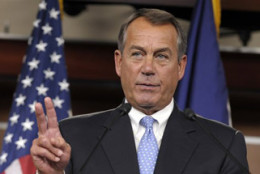sequestration
-
This past summer, defense experts gathered into teams to map out how to cut DoD's budget by a half trillion dollars over 10 years. The results from the game provide some guidance on ways to make the cut happen in real life based on strategic choices, the organizers say.
November 28, 2012 -
There's a little more than a month to go until sequestration kicks in, taking more than a $1 trillion from agency budgets over 10 years unless Congress finds a way to agree on a Plan B for deficit reduction. In this week's edition of On DoD, Jared Serbu, Federal News Radio's DoD reporter, talks with several defense experts about sequestration and the Defense budget in a second term under President Obama:
November 21, 2012 -
Walton Francis, THE expert on the federal health-insurance program, joined host Mike Cause to answer federal employees' and retirees' questions about finding the right plan during Open Season, which runs through Dec. 10.
November 21, 2012 -
Sen. Mark Warner (D-Va.) told The Federal Drive with Tom Temin and Emily Kopp that a large number of lawmakers from both parties support a plan that raises more revenues and recognizes that entitlement programs have got to be made viable over the long term.
November 19, 2012 -
Federal health benefits expert Walton Francis will talk about FEHBP open season, and Federal Times reporter Sean Reilly will discuss sequestration and other issues affecting federal workers. November 14, 2012
November 14, 2012 -
In his first news conference since Election Day, President Barack Obama took questions from reporters on a range of issues, including impending across-the-board budget cuts and the widening sex scandal that ensnared CIA Director David Petraeus.
November 14, 2012 -
Averting sequestration sits atop the to-do as Congress returns Tuesday from a seven-week election break to a long list of unfinished business.
November 13, 2012 -
Deltek's Ray Bjorklund and Kevin Plexico will talk about how contractors will be affected by sequestration and other issues. November 12, 2012(Encore presentation November 26, 2012)
November 12, 2012 -
Charles Clark, senior reporter at Government Executive magazine will talk about what's in store for federal agencies, now that President Obama has won a second term. November 9, 2012(Encore presentation November 30, 2013)
November 09, 2012 -
"Fog bank" of threatened automatic spending cuts makes predicting Defense policy under a re-elected President Obama difficult. But experts agree DoD is likely to take more cuts, with or without sequestration.
November 09, 2012 -
A new report from independent watchdog group OMB Watch suggests the White House has a few tools at its disposal to blunt the impact of the automatic, across-the-board cuts. The strategies include shifting funds around within agencies and the Office of Management and Budget and agencies, themselves, shifting funds and controlling the rate of federal spending, said Patrick Lester, the director of federal fiscal policy for OMB Watch.
November 08, 2012 -
NARFE's David Snell joins host Mike Causey to talk about best health care buys for federal retirees. Sean Reilly from the Federal Times will discuss the presidential election and its impact on feds. November 7, 2012
November 07, 2012 -
President Barack Obama's victory over Republican Challenger Mitt Romney didn't come as a surprise to anyone who was following the pre-election polls. Few surprises occurred in the congressional races as well, which suggested a return of the status quo in Washington and continued gridlock ahead.
November 07, 2012 -
Pentagon makes one more plea for a resolution to sequestration. A regular budget, an annual authorization bill and a resolution to the fight over cybersecurity laws would be helpful as well.
October 26, 2012 -
During Monday night's debate, President Barack Obama and Republican challenger Mitt Romney discussed their different approaches to cutting the budget, particularly in the area of military spending. Romney criticized the Obama administration for proposing cuts to military spending, particularly through sequestration. Obama countered sequestration would not happen, and he said he would maintain military spending based on the needs of the Defense Department.
October 23, 2012




